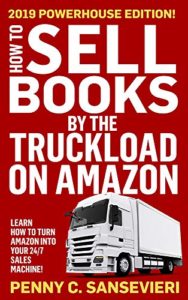 by Penny C. Sansevieri
by Penny C. Sansevieri
Many authors struggle with their website, and I understand the challenges. That said, the effect a website can have on your book sales cannot be ignored.
Maybe you’ve plugged away at your book promotion for a while, or perhaps you’re just beginning your author journey, but having a good website is a serious piece of your foundation, and getting it working for you and generating book sales from it aren’t as complicated as you might think.
I’m sure you’ve already been told you need a website, but there’s a big difference between a website and a book-sales tool. There are subtle ways to build the latter into your website’s book marketing to sell more books, and to do so without screaming that objective from the rooftops. Let’s have a look.
Creating an Author Website Is Like Shopping for Toothpaste
When was the last time you shopped for toothpaste? Maybe you have a brand you love and go right to it, but if you’ve ever decided to try another brand or couldn’t find the one you wanted, you will be faced with myriad choices—so many, in fact, that I bet at some point you just grabbed one with a flavor you liked, and decided to make it work.
I always talk about smarter book promotion, not more book promotion. So when it comes to websites, consider the toothpaste aisle. The confused mind isn’t really a shopper. In fact, when it comes to online shopping, most confused minds won’t decide at all, they’ll just pop off and go somewhere else.
The takeaway here is: don’t give your audience too many options. If you want to sell more books, you have to narrow the choices.
Pick One Goal and Really Go for It
Before you even begin to think about what your site will look like, you need to decide on what your goal is. If your goal is to sell books, then your book should be front and center. If your goal is to sell services, then that should be the first thing your visitors see. While you may have lots of books and a lot of goals for your entire book-promotion plan, you’re only allowed to have one objective for your homepage.
Understanding the Book-Sales Funnel
A good book-marketing funnel isn’t obvious to the consumer, but it’s obvious to you as you put together your website. If you look at the AME homepage, you won’t see our marketing funnel, but it’s there. Our goal on our website is to gather new business, so the entire site is set up to funnel potential authors to our book-marketing services and then our contact form. We don’t have a store, and we don’t have a ton of options. We limit visitors’ choices to help them focus on our book-promotion services, thereby limiting any confusion as to what we do and/or how they can get started working with us.
Components of a Successful Website
When it comes to designing a website, less is more. By this I mean don’t have a ton of pages on your site or a lot of navigation options. Your website navigation should be simple. We have six options on our navigation, but no drop-downs underneath those options. You’ll see some websites that have limited navigation, but beneath each option there is a drop-down with more choices.
Remember: it’s about funneling. Don’t give consumers too many choices or they won’t know where to go. This is why it’s always a good idea to work with a professional, and a lot of book-marketing companies have consulting and evaluation options.
So what pages should be on your website? The Home Page, Contact, and About pages are pretty standard. What to add beyond that is up to you. If you have a newsletter, you can have a newsletter tab, and if you have a speaking career or are doing a book tour, you can add that as well.
Choose Your Words Carefully
Consumers don’t read websites, they scan, so the fewer words you have on any page, the better. My general rule is 250 words or less. Bullet points are also great, so any text that can be formatted in that way should be. Remember, the text needs to be easy to scan.
In terms of website copy, this isn’t always easy. I generally hire someone to write mine, but if that’s not in your book-marketing budget, be careful of the words you use. Make sure the verbiage makes sense to your consumer. This isn’t about you, it’s about them. Only mention your dog if it’s relevant, or if it’s a fun one-liner in a bio.
If you’ve written a self-help or some other nonfiction book, any words on your website should clearly show how your book can benefit the reader. If you’ve written fiction, your elevator pitch on the homepage should pull new readers into your story. This is book marketing 101.
How to Really Sell Books
 An author builds a site not just for a book-promotion platform, but also for book sales. It’s important to note that most people won’t buy a book from your store, at least not right away. Most website book sales are made over time, as you build a relationship with your reader. You could opt to send readers to Amazon, and many authors do. But sometimes you want to try to keep sales to your own website, and for that, you may need a little special something extra.
An author builds a site not just for a book-promotion platform, but also for book sales. It’s important to note that most people won’t buy a book from your store, at least not right away. Most website book sales are made over time, as you build a relationship with your reader. You could opt to send readers to Amazon, and many authors do. But sometimes you want to try to keep sales to your own website, and for that, you may need a little special something extra.
So, let’s say you have a book out in paperback, eBook, and hardcover. In order to entice readers from Amazon, you could offer the hardback on your site only (so it would not be on Amazon). And to make it extra special, you could offer an autographed copy.
For book marketing to be effective, you should try to get in front of your potential reader multiple times. Newsletters are a great book-marketing tool. I’m a huge fan of every author website having a newsletter sign-up. If you don’t have any idea what you’d write about, or don’t have a list yet, don’t worry. We all needed to start somewhere. Get that sign-up form on your website to start building your list.
The Takeaway
Having an author website that actually helps you with your book promotion and sells books isn’t an impossible goal. It just needs to be done in such a way that you actually sell to your potential customer. Start planning yours by brainstorming your goals, then compile a list of sites you like. Decide whether you want to go DIY or hire a professional to build yours, and then work on populating the pages with scannable text and simple choices.
Penny Sansevieri, CEO and founder of Author Marketing Experts, Inc. (AME) and an adjunct professor at NYU, is a best-selling author and internationally recognized book marketing and media relations expert. Her company is one of the leaders in the publishing industry and has developed some of the most cutting-edge book marketing campaigns.
